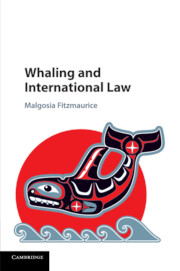Book contents
- Frontmatter
- Contents
- List of abbreviations
- Acknowledgements
- Table of cases
- Table of treaties, declarations and general comments
- Introduction
- 1 The history of whaling
- 2 The International Convention for the Regulation of Whaling
- 3 The International Whaling Commission
- 4 Cultural diversity
- 5 Environmental ethics, animal rights and the law
- 6 The IWC and its interaction with other organisations and conventions
- 7 Indigenous whaling
- 8 A case study of the protection of the narwhal whale
- Conclusion
- Appendix A Taxonomy of whales: a brief introduction on selected species
- Appendix B 1946 International Convention for the Regulation of Whaling
- Bibliography
- Index
3 - The International Whaling Commission
Published online by Cambridge University Press: 05 December 2015
- Frontmatter
- Contents
- List of abbreviations
- Acknowledgements
- Table of cases
- Table of treaties, declarations and general comments
- Introduction
- 1 The history of whaling
- 2 The International Convention for the Regulation of Whaling
- 3 The International Whaling Commission
- 4 Cultural diversity
- 5 Environmental ethics, animal rights and the law
- 6 The IWC and its interaction with other organisations and conventions
- 7 Indigenous whaling
- 8 A case study of the protection of the narwhal whale
- Conclusion
- Appendix A Taxonomy of whales: a brief introduction on selected species
- Appendix B 1946 International Convention for the Regulation of Whaling
- Bibliography
- Index
Summary
Introduction
This chapter will describe and analyse the structure, development and functioning of the International Whaling Commission (IWC). It is organically linked to the previous chapter, which focused on the International Convention for the Regulation of Whaling (ICRW). The IWC is a regulatory body of the Whaling Convention. Much has been written about it: but as the present author has observed, for reason of completeness and also of a better understanding of current developments, it is necessary to outline the fundamental issues regarding this international body. In broad brushstrokes, it may be said that the structure and decision-taking procedure of the IWC do not differ greatly from those of such bodies as the fisheries commissions or the bodies of the Conventions adopted under the auspices of the International Maritime Organization, the majority of which take their decisions on the basis of the opting-out system (or tacit acceptance). In this chapter the Judgment in the Whaling in the Antarctic case, in which the International Court of Justice made important statements regarding not only scientific whaling but also interpretation of the ICRW and its Article VIII (scientific whaling), will be analysed as well.
General overview and structure of the International Whaling Commission
Introduction
As noted in Chapter 2, concerns over the oceans’ stocks of whales first arose in the initial decades of the twentieth century due to serious depletion resulting from the development of the whaling industry, and, in particular, modern methods of whaling such as the use of boats with steam engines, harpoon guns and factory ships, in the latter half of the nineteenth century. These developments arose to meet the growing demand for whaling products, particularly whale meat, whale oil and baleen, which existed during the nineteenth century and the first half of the twentieth century. These products constituted a lucrative resource; and a number of major States had mature commercial whaling industries. It was against this backdrop that international legal regulation of whaling was introduced through a series of conventions culminating in the conclusion in 1946 of the ICRW, which remains to this day the main international vehicle for the interstate regulation of whaling, and which operates, as discussed in Chapter 2, a treaty regime that includes the IWC set up pursuant to the Convention.
- Type
- Chapter
- Information
- Whaling and International Law , pp. 57 - 122Publisher: Cambridge University PressPrint publication year: 2015
- 2
- Cited by



